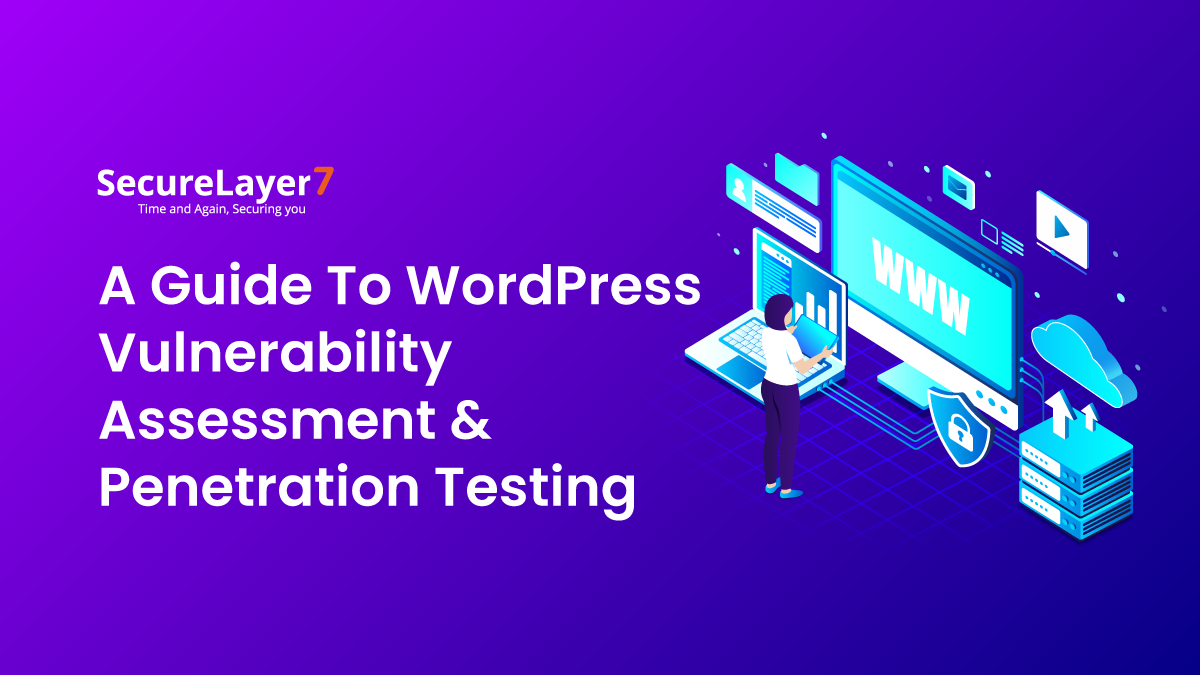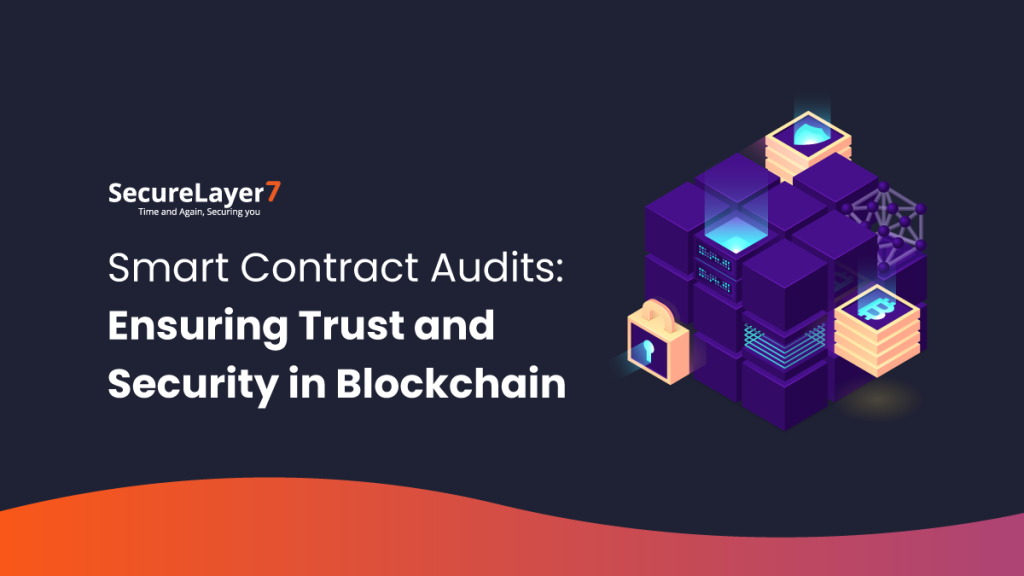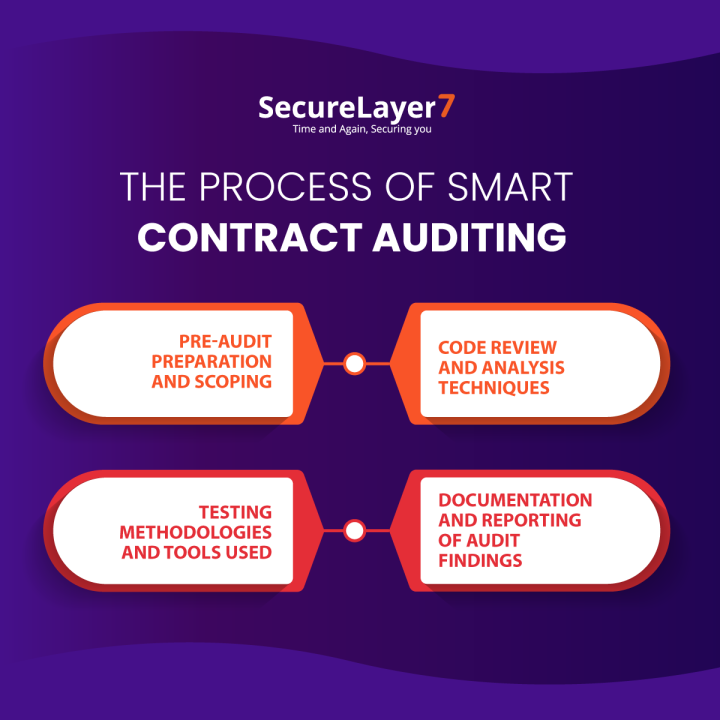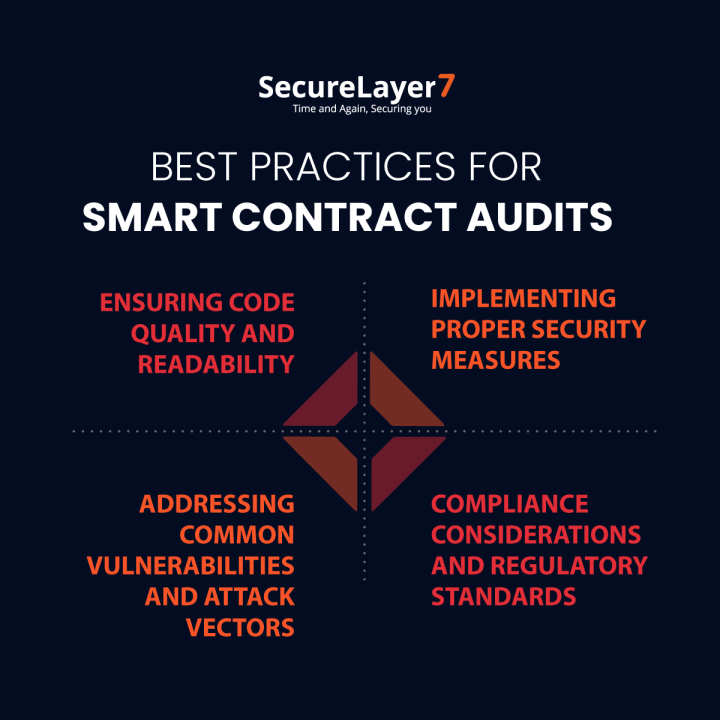
AppSec vs DevSecOps: Navigating the Security Landscape
August 1, 2023
A Guide To WordPress Vulnerability Àssessment & Penetration Testing
August 10, 2023
In today’s rapidly evolving blockchain landscape, smart contracts are pivotal and powerful tools for executing automated transactions and agreements.
These self-executing contracts run on decentralized networks, eliminating the need for intermediaries and enhancing efficiency.
However, the trust and security of these contracts are paramount, as any vulnerabilities can lead to potential exploits, financial losses, and damage to the reputation of blockchain projects.
This is where smart contract audits come into play. A smart contract audit is a comprehensive review and analysis of a contract’s code, functionality, and security measures.
Smart contract audit is much more essential than any other testing or audit in technology because of the fact that it revolves around the transactions on the blockchain. What is important to consider here is that any transaction that happens on the blockchain is irreversible.
Having said that, it becomes a necessity for a developer to build right and strong from the beginning.
Let us explore more about smart contract auditing in this blog. We will take you through all the stages of auditing and will learn about smart contract auditing in detail.
Objectives and Benefits of Smart Contract Audits:
The primary objective of a smart contract audit is to enhance the security and robustness of the contract.
It involves a meticulous examination of the codebase, logic, and design patterns used in the smart contract.
Auditors evaluate the contract’s compliance with best practices, industry standards, and specific security requirements.
Conducting regular smart contract audits brings several benefits. Firstly, audits help identify and mitigate potential vulnerabilities, reducing the risk of hacks, exploits, or unintended consequences.
They also ensure compliance with regulatory frameworks and legal obligations. Additionally, audits provide transparency and build trust among stakeholders, such as investors, users, and partners.
Ultimately, smart contract audits foster the growth and adoption of blockchain technology by establishing a solid foundation of security and reliability.
Common Vulnerabilities and Risks in Smart Contracts:
While smart contracts offer numerous benefits, they are not immune to vulnerabilities and risks. Understanding these potential weaknesses is crucial for conducting effective audits.
Let’s explore some common vulnerabilities often encountered in smart contracts:
Reentrancy Attacks: This vulnerability allows an attacker to repeatedly enter and exit a contract, manipulating the flow of execution and potentially draining funds or causing unexpected behavior. The notorious DAO hack in 2016 is a prime example of a reentrancy attack, which resulted in the loss of millions of dollars.
Integer Overflows and Underflows: Mishandling integer operations can lead to unexpected results, allowing an attacker to exploit arithmetic operations for their advantage. The infamous “King of the Ether” incident in 2016 demonstrated the consequences of unchecked integer arithmetic.
Denial-of-Service (DoS) Attacks: Smart contracts can be susceptible to DoS attacks, where an attacker consumes excessive computational resources or exploits inefficiencies in the contract’s logic to disrupt its intended functionality. The Fomo3D game on the Ethereum network experienced a DoS attack, causing significant congestion and delays.
Front-Running: Front-running occurs when an attacker exploits their knowledge of pending transactions to manipulate the order of execution, gaining an unfair advantage. This vulnerability can lead to financial losses or unfair outcomes. Recent incidents involving decentralized finance (DeFi) protocols have highlighted the risks associated with front-running.
Insecure Random Number Generation: Generating random numbers securely within a smart contract is challenging. Predictable or manipulated random number generation can be exploited by attackers, impacting the fairness of applications such as gambling or decentralized games.
It is important to stay informed about recent happenings in the smart contract space.
Some notable incidents include the 2020 bZx protocol attacks, where attackers exploited vulnerabilities to manipulate token prices and drain funds.
Additionally, the multiple flash loan exploits on various DeFi platforms have raised concerns about the overall security of smart contracts.
The Process of Smart Contract Auditing
Smart contract auditing involves important stages of analysis. Each step plays an important role and contributes equally to create a seamless contract. Below are the steps that are followed and we will learn about these in detail one by one.

Pre-audit preparation and scoping
In the pre-audit phase of a smart contract audit, it is crucial to establish clear objectives and define the scope of the engagement.
This involves understanding the contract’s purpose, intended functionality, and any specific requirements or standards that need to be considered during the audit process. Close collaboration with the contract developers or project team is essential to gather relevant documentation and specifications.
During this phase, auditors work closely with the stakeholders to define the boundaries of the audit, identifying the specific contracts, modules, or functionalities to be assessed.
Gathering relevant documentation and specifications is a crucial aspect of pre-audit preparation. Auditors require access to the contract’s codebase, technical specifications, architectural diagrams, and any existing security requirements or guidelines.
Through discussions and exchanges of insights, auditors can clarify any ambiguities, address questions, and gain a comprehensive understanding of the contract’s intricacies and objectives. This collaborative approach ensures that the audit process is aligned with the contract’s intended behavior and goals.
Code Review and Analysis Techniques:
Codebase is one of the important aspect of any software and so it is for the smart contracts. Code review becomes really important because when it come to bundling a software from the scratch there can be thousands of the lines of code.
Let us see how code review is accomplished.
This phase employs various techniques to ensure the contract’s security and reliability. Let’s explore the key components of code review and analysis.
- Manual Code Review – Auditors conduct a meticulous manual review of the contract’s codebase. This involves scrutinizing the code line by line to identify potential vulnerabilities, logic errors, or deviations from best practices. Manual code review allows auditors to understand the contract’s structure, verify its intended functionality, and identify any potential security risks or inefficiencies.
- Automated Tools and Analysis – To augment the manual review process, auditors leverage automated tools and analysis techniques. Static analyzers, for example, scan the codebase for common programming errors, including potential vulnerabilities such as reentrancy or integer overflow. Symbolic execution tools explore different execution paths to identify edge cases or unexpected behavior. Fuzzing techniques can be employed to test the contract’s resilience against unexpected inputs.
- Security Standards and Best Practices – During code review, auditors evaluate the contract’s compliance with security standards and best practices. They verify whether the code follows established guidelines, such as the OpenZeppelin library or industry-specific security recommendations. Assessing the contract against these standards helps identify areas where improvements can be made to enhance security and reduce potential risks.
- Logic and Design Patterns – Auditors analyze the contract’s logic and design patterns to ensure they align with the intended functionality and desired outcomes. They look for potential vulnerabilities resulting from incorrect or ambiguous logic, as well as instances where common design patterns may introduce security risks. Evaluating the contract’s overall design helps identify potential pitfalls and suggests alternative approaches for improved security and efficiency.
Testing Methodologies and Tools Used
Tools and techniques have always been a helping hand in any process. It saves time and increases accuracy. Well, we do have some tools and techniques
Thorough testing is a crucial aspect of smart contract audits to identify and address potential vulnerabilities and ensure the contract’s reliability. Various testing methodologies and tools are employed during the audit process. Let’s explore some of them:
- Unit Testing: Unit testing involves testing individual components or functions of the smart contract in isolation to ensure they function correctly. Auditors create test cases that cover different scenarios and edge cases, verifying the contract’s expected behavior. Unit testing helps identify bugs, logic errors, or unintended consequences at a granular level, allowing for targeted fixes and improvements.
- Integration Testing: Integration testing assesses how different components of the contract interact and function together. It focuses on testing the contract’s interactions with other contracts, external systems, or oracles. Auditors verify that data flows correctly, contracts communicate as intended, and external dependencies are handled securely. Integration testing ensures the contract functions as expected in real-world scenarios and prevents unexpected behaviors or vulnerabilities.
- Fuzz Testing: Fuzz testing involves feeding the contract with a large number of unexpected or random inputs to uncover potential vulnerabilities or weaknesses. By intentionally providing invalid or unusual inputs, auditors can assess how the contract responds to such situations. Fuzz testing can help identify boundary conditions, unexpected behaviors, or potential security vulnerabilities that may not be easily discovered through other testing methodologies.
- Security Analysis Tools: Auditors employ specialized security analysis tools designed for smart contracts to identify common vulnerabilities and potential security risks. These tools perform static analysis, dynamic analysis, or a combination of both on the contract’s codebase. They can identify coding patterns that may lead to vulnerabilities, detect potential security weaknesses, or highlight areas where the contract may be prone to attacks. Security analysis tools aid auditors in identifying security-related issues efficiently.
- Formal Verification: Formal verification is a rigorous technique used to mathematically prove the correctness of the contract’s behavior or certain properties. It involves applying formal logic and mathematical models to analyze the contract’s codebase and validate its correctness according to predefined specifications. Formal verification can help identify critical vulnerabilities or logic errors that may not be apparent through other testing methodologies.
After we’re done with the audit process. It is now time to document all the findings. Combining tools, technicuqes, automation and manual effort does gives a lot of insights that add values in the development cycle.
Let us move to our next sections where we will get to know everything about reporting and documentation.
Documentation and reporting of audit findings
After the auditors are done with their process, they doucment their findings. Their documentation includes code lags. These documents also serve as guides for further development projects.
The auditors then sit with the team to demonstrate their findings so that the bugs and errors can be fixed by the team.
After the team works on the findings and fixes the flaws and bugs, the auditors then publish a report on the findings and the works that have been done against those findings and issues that were raised.
These reports are the concluding stage of smart contract auditing process. These reports are eveything you can look at to gauge the effectiveness of the entire auditing process.
Let us now move past the process and look at the section to learn about the best practices one can inculcate to be assured of seamless development phase of smart contracts.
Best Practices for Smart Contract Audits
There is no possible way to ensure the error free build during the building phase of any software but the best practices does helps to minimize as much errors as possible.
Here are some of the best practices to follow for Smart Contract Audits. These practices can keep you ahead of the vulnerabilities and can save a lot of time and money involved in the project. Let us understand each one of them in detail one by one.

Ensuring code quality and readability
The code is the initial step to building any program. Being the root of any software, the code should always be clean and organized. It takes quite some time and experience to write the code in such a way that it is readable and clean.
Writing clean code is another critical way to save a lot of time and money. Most of the time, if your code is clean and readable, you do not have to go back to it again and again. Even the little lags and errors become recognizable.
The quality of the code improves the overall experience of the software. Hence, it is one of the most crucial aspects to keep in mind when starting to build a smart contract.
Addressing common vulnerabilities and attack vectors
Smart contracts are vulnerable to various types of attacks. To conduct a comprehensive audit, pay attention to common vulnerabilities, such as:
Reentrancy Attacks: Prevent reentrancy attacks by ensuring that contract state changes occur before any external calls. Implement the “checks-effects-interactions” pattern to mitigate reentrancy risks.
Integer Overflow/Underflow: Validate and handle arithmetic operations carefully to avoid unintended behaviors due to integer overflow or underflow, which can lead to exploits.
Denial-of-Service (DoS) Attacks: Analyze the contract’s design for potential DoS vulnerabilities, such as gas-guzzling operations or external dependencies that could block contract execution.
Compliance Considerations and Regulatory Standards:
Smart contracts are subject to various compliance requirements and regulatory standards. When conducting an audit, consider the following aspects:
Data Privacy: Assess if the contract handles sensitive data appropriately, adhering to privacy regulations such as the General Data Protection Regulation (GDPR) or similar frameworks.
Know Your Customer (KYC) and Anti-Money Laundering (AML) Compliance: Evaluate if the contract incorporates necessary identity verification processes and adheres to AML regulations when dealing with financial transactions.
Jurisdictional Compliance: Determine if the smart contract complies with relevant laws and regulations based on the targeted jurisdictions, such as securities regulations or consumer protection laws.
Choosing a Smart Contract Audit Provider
Selecting the right audit firm is crucial to ensure a thorough and reliable assessment of your smart contract’s security and compliance.
Several factors should be considered when choosing an audit provider, including the experience and expertise of auditors, the reputation of the firm, and cost considerations.
This section outlines key factors to consider when selecting a smart contract audit provider. Let us have a look.
Experience and Expertise of Auditors:
The experience and expertise of the auditors are critical factors in determining the quality of the audit. Consider the following aspects:
Technical Proficiency: Ensure that the audit firm has a team of auditors with strong technical knowledge of blockchain technology, smart contract development, and relevant programming languages (e.g., Solidity).
Previous Audit Experience: Evaluate the auditors’ track record in conducting smart contract audits. Look for firms that have experience auditing projects similar to yours, preferably in the same industry or domain.
Security and Industry Certifications: Check if the auditors hold relevant certifications such as Certified Ethical Hacker (CEH) or Certified Blockchain Security Professional (CBSP). These certifications demonstrate their commitment to best practices and industry standards.
Reputation and References:
Research the reputation of the audit firm and gather references from their previous clients. Consider the following:
Industry Recognition: Look for audit firms that are well-known and respected within the blockchain and smart contract auditing community. Check for any awards, industry affiliations, or partnerships that signify their credibility.
Client Testimonials: Seek feedback from previous clients of the audit firm. Their experiences and opinions can provide valuable insights into the quality of the audit and the professionalism of the auditors.
Case Studies and Published Reports: Review any case studies or published audit reports provided by the firm. This allows you to assess their approach, thoroughness, and attention to detail in uncovering vulnerabilities and ensuring compliance.
Comprehensive Audit Methodology:
Understand the audit firm’s methodology and processes for conducting smart contract audits. Consider the following:
Scope and Depth of Audit: Assess the extent to which the audit firm examines your smart contract. Look for comprehensive audits that cover code review, vulnerability assessment, and compliance considerations.
Tools and Technologies: Inquire about the tools and technologies the audit firm employs to identify vulnerabilities and analyze the contract’s security. A combination of manual code review and automated analysis tools can yield more thorough results.
Reporting and Communication: Understand how the audit findings will be communicated to you. Look for clear and concise reports that detail identified vulnerabilities, their severity, and recommended remediation steps.
Cost Considerations and Budgeting:
The cost of a smart contract audit can vary depending on factors such as the complexity of the contract and the reputation of the audit firm. Consider the following:
Value for Money: While cost is an important factor, prioritize the quality and comprehensiveness of the audit over the price. A thorough audit from an experienced firm can potentially save you significant costs in the long run by preventing security breaches or regulatory non-compliance.
Request Multiple Quotes: Obtain quotes from different audit firms and compare them based on the scope of the audit, deliverables, and expected level of service. Ensure that the pricing structure is transparent and aligned with your budget.
Budget Allocation: Allocate a reasonable budget for the audit based on the complexity and criticality of your smart contract. Consider it as an investment in the security and trustworthiness of your project.
Summing Up
In conclusion, smart contract audits are of utmost importance when it comes to the security and compliance of blockchain-based applications.
Through this blog post, we have explored the significance of conducting audits, as well as the objectives and benefits they offer.
By following best practices during the audit process, businesses can significantly enhance the trustworthiness of their smart contracts.
Ensuring code quality and readability, implementing proper security measures, addressing common vulnerabilities, and adhering to regulatory standards are key aspects that should be given due consideration.
Moreover, selecting a reputable audit provider is crucial. Evaluating the experience and expertise of auditors, considering the firm’s reputation and client testimonials, and balancing cost considerations are essential factors to keep in mind.
A reliable audit provider can contribute to the overall success of the project by providing a thorough and reliable assessment of the smart contract’s security and compliance.
Fortify Your Smart Contracts with SecureLayer7
Are your smart contracts really secure? Trusting in a rapidly evolving blockchain landscape requires an ironclad shield of protection.
Enter SecureLayer7, your ultimate guardian for smart contract auditing services. We are a team of expert security enthusiasts dedicated to fortifying your blockchain solutions against potential vulnerabilities and hacks.
Don’t gamble with security; safeguard your smart contracts today by talking to us.